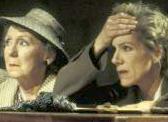SEARCH CurtainUp
REVIEWS
FEATURES
NEWS
Etcetera and
Short Term Listings
LISTINGS
Broadway
Off-Broadway
BOOKS and CDs
OTHER PLACES
Berkshires
London
LA/San Diego
DC
Philadelphia
Elsewhere
QUOTES
On TKTS
LETTERS TO EDITOR
FILM
LINKS
MISCELANEOUS
Free Updates
Masthead
NYC Weather
 London Review
London Review
We Happy Few
by Lizzie Loveridge
|
The terrible thing about pets is that the ones you loathe seem to live for ever
--- Flora |

Marcia Warren as Flora and Julit Stevenson as Hettie
(Photo: Catherine Ashmore) |
The first act serves to bring the troupe together. There is Hettie (Juliet Stevenson), the founder, a brusque organiser in a man's raincoat and Flora (Marica Warren) all fussy sympathy and good nature. We have those facing prejudice, mother (Rosemary McHale) and son (Adam Davy), Jewish refugees from Germany, and Ivy (Cat Simmons) the maid from Birmingham in the Midlands whose parentage is mixed race. Patsy Palmer plays Charlie the working class girl who wears men's suits and is happier under the bonnet of a Rolls Royce than riding in one as a passenger. Kate O'Mara is Helen, a fading star who drinks too much and has crushed the self esteem of her aspiring actress daughter Rosalind (Emma Darwell-Smith). The second act sees such a catalogue of related disasters, from suicide of gay relative, the death, in the war, of a bastard child conceived by rape, to the death by doodlebug, or flying bomb, of a pregnant member of the troupe.
The pedigree of the cast is such that this should have been a very fine production. Juliet Stevenson is rarely off stage, and then only to execute a swift costume change, and is called upon to play traditional male roles like Macbeth with a false beard. We get a fairly large chunk of the Scottish play with the usual catalogue of disasters which seem to dog this unlucky play. Sadly even the combined talent of Juliet Stevenson and Marcia Warren fail to lift We Happy Few.
John Napier's set is a crowded and dingy storeroom with tall covered rails of hanging storage for costumes. It may look like wartime austerity but it offers little other than grey backdrop. An initial historical pageant of costumed figures from history is fun but proves superfluous.
I think I liked this anodyne play more than did the men I spoke to. It is after all concerned with how people relate to each other rather than action. However there are some glaring anachronisms, an allusion to a room being "en suite" screams from the future to upset those concerned with historical accuracy.
The play has that very British feel, a gentle look at kindness and the human spirit in adversity, qualities well displayed in films of the period like Mrs Miniver. However at three hours five minutes, the whole sprawls relentlessly to include every funny but detailed thespian (funny how that gets confused with lesbian) story to the point of tedium. This is a play sadly in need of a pair of editorial scissors to bring it down to an acceptable hour and three quarters. I know that We Happy Few's director, Trevor Nunn, is married to the playwright but as an experienced director, he would have done his wife a favour to suggest a healthy trim. I hope that Imogen Stubbs will continue to write, she has a good ear for dialogue, and that this first West End experience will ensure that she has an editor who will demonstrate the old adage that "Less is More".
| We Happy Few
Written by Imogen Stubbs Directed by Trevor Nunn Starring: Juliet Stevenson and Macia Warren With: Rosemary McHale, Adam Davy, Paul Bentley, Cat Simmons, Caroline Blakiston, Patsy Palmer, Emma Darwall-Smith, Kate O'Mara Set Designer: John Napier Costume Design: Elise Napier Choreographer: Henry Metcalfe Lighting Designer: David Hersey Sound: Colin Pink Music: Stephen Edis Fight Director: Malcolm Ranson Running time: Three hours and five minutes with one interval Box Office: 0870 890 1106 Booking to 13th November 2004. Reviewed by Lizzie Loveridge based on 5th July 2004 performance at the Gielgud Theatre Shaftesbury Avenue London W1 (Tube: Piccadilly Circus) |


Mendes at the Donmar
Our Review

Peter Ackroyd's History of London: The Biography

London Sketchbook

Retold by Tina Packer of Shakespeare & Co. Click image to buy.
Our Review

6, 500 Comparative Phrases including 800 Shakespearean Metaphors by CurtainUp's editor.
Click image to buy.
Go here for details and larger image.
